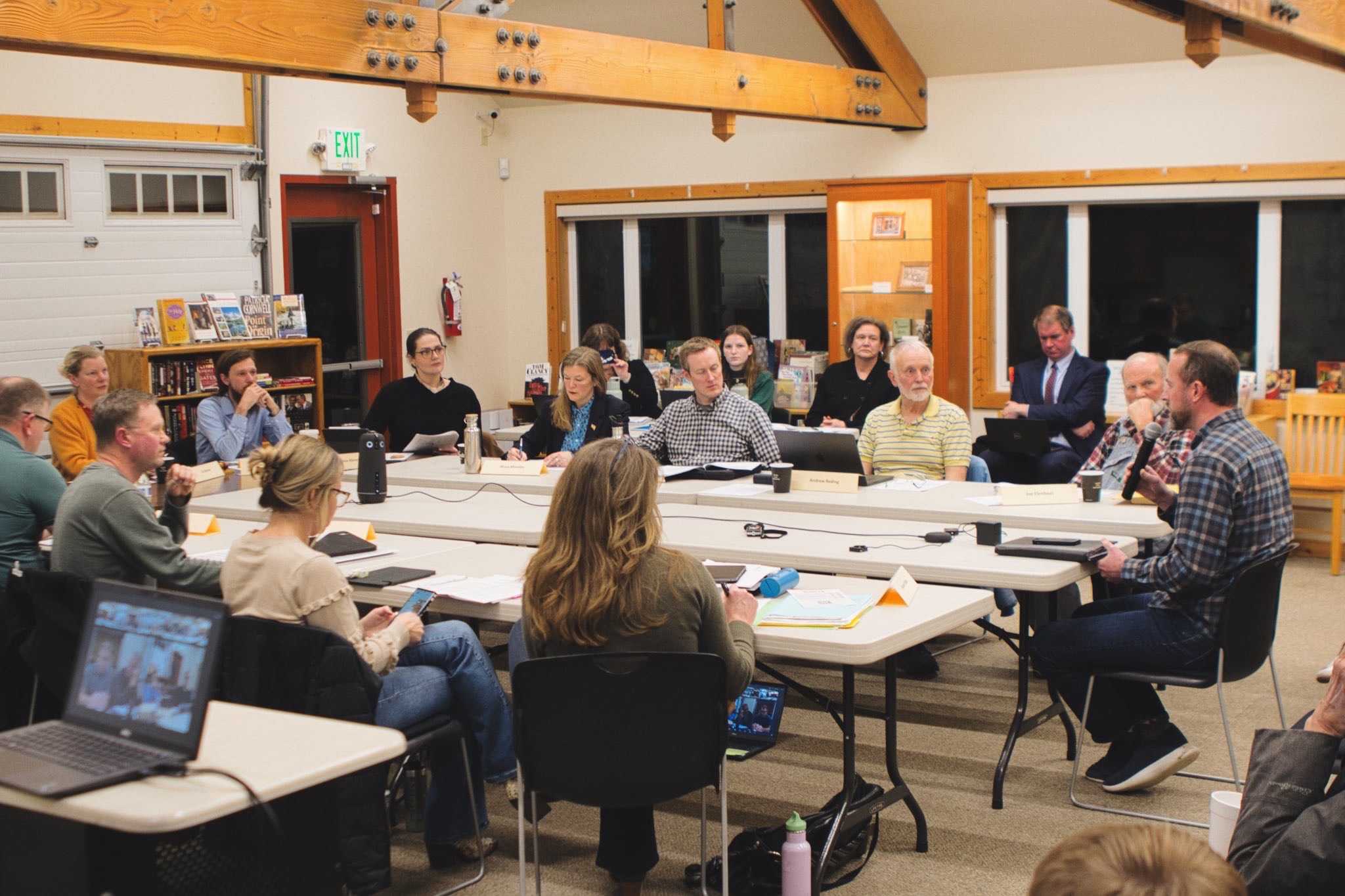By Greg Thames
Editor’s Note: After this article was published, Commissioner Maya Morales informed Bellingham Metro News that the motion she introduced was for “commissioners shall be salaried,” not for “stipends,” as originally reported. We have corrected this error. We are committed to accuracy and transparency and appreciate Commissioner Morales for the correction.
Whatcom County, Wash. – The Whatcom County Charter Review Commission convened in Deming, Washington at the Deming Library, on the ancestral lands of the Nooksack Tribe, where they received a warm welcome from Nooksack tribe’s Vice Chair Anna Brewer. The commission’s ongoing review of the county charter, a document akin to a local constitution, is a crucial process that shapes the structure and function of county government. This meeting focused on key areas for potential charter amendments: equitable representation, the balance of power between the executive and legislative branches, and the rules governing citizen-initiated changes.
One of the central discussions revolved around the signature requirements for citizen-initiated referendums and charter amendments. Currently, initiating a county referendum requires a specific number of signatures, and a separate, higher threshold exists for charter amendments. During the Thursday session, Commission members addressed two motions concerning these signature requirements. The first motion, aimed at modifying the referendum signature thresholds, failed to achieve the necessary 10-vote supermajority, falling short by just one vote with 9 in favor and 4 against with 1 absent. This outcome means the referendum signature thresholds remain unchanged for the time being.
The commission then considered a split motion regarding public-proposed charter amendments. The first part, which successfully passed, shifts the signature requirement calculation from the governor’s race to the county executive race. However, the second part of the motion, dealing with changing the percent of the voters in the executive, was left unresolved. The governor election has historically had more voter participation, which would require a larger amount of signatures. This partial change, if ultimately approved by voters, would significantly lower the signature threshold for citizen-initiated amendments, potentially reducing it from approximately 20,000 to roughly 10,000. This would make altering the county charter nearly as accessible as initiating a citizen referendum, a point of considerable debate.
During public comment, Greg Warden presented “The Parable of the Roast Chicken,” an allegory illustrating the perceived inequities in the current county district arrangements. Warden’s parable compared the county’s representation system to an unfair family dinner, where some receive large portions while others get scraps, despite everyone having equal rights. A representative from Fair Vote Washington, a non-profit advocating for proportional representation, further reinforced these concerns, arguing that the current system disproportionately impacts voters in our county.
The commission also addressed allegations of charter violations by the county executive. Commissioner Redding’s resolution, proposing the hiring of an independent attorney to conduct a legal review, received majority support, emphasizing the commission’s commitment to transparency and accountability.
Following these discussions, the commission turned its attention to Article Two of the charter, which governs the legislative branch. Whatcom Council Member Jon Scanlon highlighted an imbalance between the executive and legislative branches, arguing that the legislative branch lacks sufficient staffing, funding, and oversight powers. He advocated for strengthening the legislative branch through increased resources, suggesting the reintroduction of performance audits and the creation of a Public Advocate/Ombuds role, similar to the one in King County, to enhance oversight and citizen advocacy.
Conversely, Whatcom Council Member Mark Stremler offered contrasting perspectives. He proposed the elimination of at-large council positions in favor of district-only representation, arguing this would give more localized power to the county residents. He also called for more robust job descriptions for council members, including specific time requirements and in-person attendance expectations. Additionally, Council Member Stremler advocated for implementing a supermajority vote requirement for budget approvals, believing that this would foster more bipartisanship.
Commissioner Maya Morales presented a motion to provide salaries (originally reported as stipends: see editors note.) for charter commissioners, who currently serve as volunteers. She argued that this would ensure that economic circumstances do not prevent qualified and diverse individuals from serving. The commission will consider this motion at their next meeting. The stipend amount was not discussed.
As the commission continues its work, these discussions reflect fundamental questions about democratic representation, separation of powers, and citizen participation within the framework of the county charter. The unfinished business regarding charter amendment thresholds could significantly impact how easily citizens can propose future charter changes, shaping the future of Whatcom County’s governance.
The next Charter Review Commission meeting will be held from 6:00 pm to 9:00 pm on Thursday, March 13 at the Whatcom County Library in Blaine, located at 610 3rd St, Blaine, WA 98230.
Stay informed by following Bellingham Metro News coverage to see how these potential changes might impact you and your community.
#WhatcomCharter, #WhatcomGov, #CharterWatch2025
Discover more from Bellingham Metro News
Subscribe to get the latest posts sent to your email.





